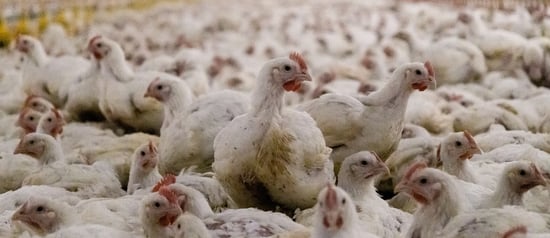
Why higher-welfare farming is the future
Blog
Across the UK and beyond, farmers are proving that there’s a better way to farm. Farming that is better for animals, people, and the planet.
It’s called higher-welfare farming, and it’s showing that cruelty and profit don’t have to go hand in hand.
On factory farms, animals live in cramped sheds and treated like production units, with little regard for their well-being. In contrast, higher-welfare farms give animals space, fresh air, and the freedom to behave naturally — while also helping to restore our soils, woodlands, and climate. To support this better way of farming, the UK needs a Just Transition: a fair and sustainable move away from industrial farming systems that harm animals and the environment, toward farming that respects animals, protects nature, and supports farmers through change.
Healthier animals, healthier farms
At Brodoclea Woodland Farm in Scotland, pigs live in 21 woodland paddocks instead of steel sheds. They forage, dig, and roam freely, which means they are living more naturally than most pigs ever get the chance to. In four years of farming, they’ve only lost one pig and have never needed a vet visit. That’s what happens when animals are raised in conditions that suit their instincts and wellbeing.

Healthier animals mean lower costs too. Factory farms depend on antibiotics and constant interventions to keep animals alive in stressful conditions. On higher-welfare farms, strong breeds and good biosecurity replace those drugs, cutting costs and improving welfare.
Read more about Brodoclea Farm
Farming with nature, not against it
High-welfare, nature-friendly systems also help restore the environment. Trees combined with pasture, and livestock means that farms like Brodoclea capture carbon, boost biodiversity, and make the land more resilient to climate change.
In these systems, animals aren’t just a source of food but they’re also part of the ecosystem. Their manure nourishes the soil, their foraging encourages regeneration, and the surrounding woodland provides natural shade and shelter.
These benefits support the environment and farmers alike, creating long-term resilience and new income streams from timber, carbon credits, and sustainable meat. Carbon credits are earned when farmers capture or reduce greenhouse gas emissions through practices like tree planting or restoring soil health. These credits can then be sold to companies looking to offset their emissions, providing an additional source of income while helping to tackle climate change.
The economics of kindness
Critics often say that higher-welfare farming is too expensive. But the numbers tell a different story. Brodoclea’s pork, for example, sells for roughly double the price of factory-farmed meat. However, the farm’s cost difference per pig is just a few hundred pounds. With fair support, that gap could close completely.
When we also factor in cleaner air, healthier soils, animal welfare, and stronger rural communities, higher-welfare farming is an investment in a sustainable future.
What’s holding us back
Despite its promise, higher-welfare farming doesn’t get the support it deserves. Current grant schemes and subsidies are still geared toward factory farming. Many funding programmes don’t support mixed farming systems, like growing trees alongside crops or animals, the very models that could help fix our food system.
Farmers want to do better, but without clear government backing, the transition is slow. It’s time for policies that reward those protecting animals and nature. Not those that exploit them.
The future of UK farming
Imagine a countryside where animals roam freely in healthy landscapes, farmers are paid fairly for sustainable food, and rural economies thrive. That’s what a just transition could deliver.
Higher-welfare farms are already leading the way. What’s missing is the political will to make it happen on a national scale.
Factory farming is failing animals, farmers, and the planet. With your voice, we can change that.
Sign our petition to call on the UK government to end cruel factory farming and support higher-welfare, nature-friendly farms instead.
Call for an end to cruel factory farming
Sign our petition to the UK government and let them know that there is no future for factory farming.
